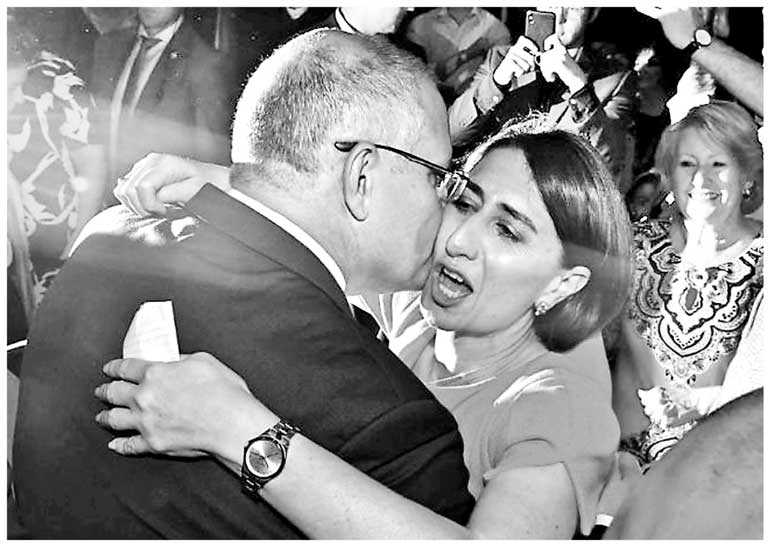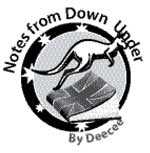Wednesday Feb 18, 2026
Wednesday Feb 18, 2026
Saturday, 6 April 2019 00:02 - - {{hitsCtrl.values.hits}}

A hug from Prime Minister Scott Morrison to NSW Premier Gladys
State elections in Australia are eagerly contested as much as the Federal elections. This was seen at last Saturday’s New South Wales (NSW) State election. The election was held to elect members for the 93 seats in the NSW Legislative Assembly, the lower house, for a period of four years. (The upper house, the Legislative Council comprises of 42 seats.)
The election was conducted by the NSW Electoral Commission, one of eight State Electoral Commissions in the country. The federal elections are conducted by the Australian Electoral Commission (AEC).
Members were elected from six parties with the Labour Party winning 36 seats. The Liberal Party was a close second with 35 seats and the National Party 13. Two minor parties – The Greens and Shooters, Fisheries & farmers (SFF) won three seats each and the balance three seats were won by three Independents.
Since the Liberals and Nationals form a Coalition, they formed the government with the leader of the Liberal Party, Gladys Berejiklian becoming Premier. Although she was the sitting premier, she had become premier and leader of the Liberal Party two years back when the former premier/leader resigned. Thus she became the first elected premier in the state.
As the counting of votes indicated victory for the Coalition, she said she was proud to live in a state where “someone with a long surname and a woman” can be premier. She had by then spoken to the opposition leader Michael Daley who had conceded defeat.
The day after the election Michael Daley resigned and deputy leader Penny Sharpe was appointed interim leader.
Funds
While political parties on Australia receive funds from the Australian Electoral Commission, they are also allowed to receive ‘political donations’. The funding by the Commission is done to reduce the influence of private money on elections which can have an impact on shaping public policy.
A political donation is named by the NSW Electoral Commission as “a gift made to, or for the benefit of, a political party, elected member, candidate, group of candidates, or other person or entity including an associated entity or third-party campaigner in New South Wales”.
A political donor is required to disclose “reportable political donations of $1,000 or more made to a political party, elected member, group, candidate, associated entity or third-party campaigner”.
The Commission has a comprehensive clarification of what a political donation means.
Voting
Voting is compulsory both for federal and state elections and the Electoral Commissions make every effort to make voting convenient for the voters. Voters have several options.
If a voter is unable to go to a polling booth on the day of the election he or she can vote earlier at designated ‘early voting centres’.
Voters can also register to vote online or by telephone. Postal voting is available.
Officials of the Commission visit nursing homes, convalescent homes, hospitals and other such institutions prior to election day.
Those who have not voted are fined $55 but they are given time to submit reasons as to why they could not vote.State elections in Australia are eagerly contested as much as the Federal elections. This was seen at last Saturday’s New South Wales (NSW) State election. The election was held to elect members for the 93 seats in the NSW Legislative Assembly, the lower  house, for a period of four years. (The upper house, the Legislative Council comprises of 42 seats.)
house, for a period of four years. (The upper house, the Legislative Council comprises of 42 seats.)
The election was conducted by the NSW Electoral Commission, one of eight State Electoral Commissions in the country. The federal elections are conducted by the Australian Electoral Commission (AEC).
Members were elected from six parties with the Labour Party winning 36 seats. The Liberal Party was a close second with 35 seats and the National Party 13. Two minor parties – The Greens and Shooters, Fisheries & farmers (SFF) won three seats each and the balance three seats were won by three Independents.
Since the Liberals and Nationals form a Coalition, they formed the government with the leader of the Liberal Party, Gladys Berejiklian becoming Premier. Although she was the sitting premier, she had become premier and leader of the Liberal Party two years back when the former premier/leader resigned. Thus she became the first elected premier in the state.
As the counting of votes indicated victory for the Coalition, she said she was proud to live in a state where “someone with a long surname and a woman” can be premier. She had by then spoken to the opposition leader Michael Daley who had conceded defeat.
The day after the election Michael Daley resigned and deputy leader Penny Sharpe was appointed interim leader.
Funds
While political parties on Australia receive funds from the Australian Electoral Commission, they are also allowed to receive ‘political donations’. The funding by the Commission is done to reduce the influence of private money on elections which can have an impact on shaping public policy.
A political donation is named by the NSW Electoral Commission as “a gift made to, or for the benefit of, a political party, elected member, candidate, group of candidates, or other person or entity including an associated entity or third-party campaigner in New South Wales”.
A political donor is required to disclose “reportable political donations of $1,000 or more made to a political party, elected member, group, candidate, associated entity or third-party campaigner”.
The Commission has a comprehensive clarification of what a political donation means.
Voting
Voting is compulsory both for federal and state elections and the Electoral Commissions make every effort to make voting convenient for the voters. Voters have several options.
If a voter is unable to go to a polling booth on the day of the election he or she can vote earlier at designated ‘early voting centres’.
Voters can also register to vote online or by telephone. Postal voting is available.
Officials of the Commission visit nursing homes, convalescent homes, hospitals and other such institutions prior to election day.
Those who have not voted are fined $55 but they are given time to submit reasons as to why they could not vote.